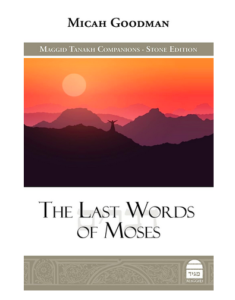By Rabbi Dr. Israel Drazin

BOCA RATON, Florida — Dr. Micah Goodman says, “No,” in his new book, “The Last Words of Moses.” Deuteronomy is “a human document authored by Moses whose inclusion in the Bible lends it divine authority. Goodman is a Research Fellow of the Kogod Research Center at Shalom Hartman Institute in Jerusalem. He was named by the Jerusalem Post as one of the 50 most influential Jews in 2017 and by Liberal Magazine as one of the 100 most influential Israelis in 2019. He states that Moses composed Deuteronomy as his last address to the Israelites he led for forty years. He quotes Don Isaac Abarbanel’s commentary on Deuteronomy 1:1, “Moses himself spoke these words, and the Divine Wisdom, may it be blessed, saw fit to command it be written as a book along with other parts of the Torah.”
 Goodman contends that Deuteronomy “is about the power of limited power. It is about a new kind of religion and a new kind of politics. These are Moses’ two revolutions.” One is “a temple without God.” The other is “monarchy without power.” He states, “The ideas that appear in Moses’ final address are very different from those presented in previous books of the Torah. The concept of God is different, the role of religion is different, and the understanding of human beings is different. The ideas in Moses’ address are more challenging than those that precede it in the Torah.” He says, “We have to accept that our tradition is not just one of conflicting interpretations of the Torah, but of conflicting ideas within the Torah itself.” Deuteronomy’s history is often very different from what is told in the previous four Torah books, and the laws are not always the same. When Moses reviews Torah’s laws, he does not include them all.
Goodman contends that Deuteronomy “is about the power of limited power. It is about a new kind of religion and a new kind of politics. These are Moses’ two revolutions.” One is “a temple without God.” The other is “monarchy without power.” He states, “The ideas that appear in Moses’ final address are very different from those presented in previous books of the Torah. The concept of God is different, the role of religion is different, and the understanding of human beings is different. The ideas in Moses’ address are more challenging than those that precede it in the Torah.” He says, “We have to accept that our tradition is not just one of conflicting interpretations of the Torah, but of conflicting ideas within the Torah itself.” Deuteronomy’s history is often very different from what is told in the previous four Torah books, and the laws are not always the same. When Moses reviews Torah’s laws, he does not include them all.- Deuteronomy’s revolution reduces the importance of the temple. For example, it does not emphasize how sacrifices bring people to God but how they bring people together. Deuteronomy diminishes the role of the ark in Israel’s past, and Jeremiah, building on this idea, has a prophesy of a future where it has no role at all. Sacrifices are restricted. Moses, for the first time, disallows making sacrifices anywhere people choose. While God is very present in the Tabernacle in Leviticus, Moses states that God is not in the temple.
- Moses’ book also diminishes the role of the king. He does not rule. He is ruled. The status of the priests as representatives of God is also downplayed. They are not intermediaries or intercessors.
- His book also contains “the first clear and explicit articulation of monotheistic faith.” Deuteronomy 4:35 states, “It has been clearly demonstrated to you that the Lord alone is God; there is none beside Him.” God is unique. Moses explains for the first time in 4:16 that people may not make an image of God because God is not representable.
- Goodman’s book is eye-opening, and his explanations of the changes Moses introduced give readers a deeper, more rational understanding of Judaism. Deuteronomy teaches how to manage religious and political power. It clarifies how learning became the center of Jewish life without monarchy and the temple.